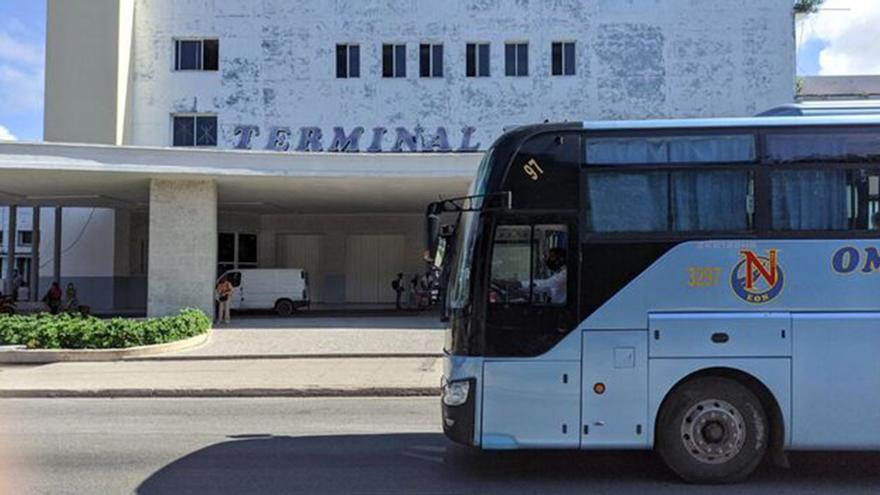
![]() 14ymedio, Havana, 9 January 2024 — Cubans have seen the new announcements on Tuesday linked to the large package of economic adjustments with which the Government seeks to “correct distortions.” The measures detailed on State TV’s Round Table program include an increase in interprovincial transport, as of March 1, which exceeds, in several cases, 180% of the current rate.
14ymedio, Havana, 9 January 2024 — Cubans have seen the new announcements on Tuesday linked to the large package of economic adjustments with which the Government seeks to “correct distortions.” The measures detailed on State TV’s Round Table program include an increase in interprovincial transport, as of March 1, which exceeds, in several cases, 180% of the current rate.
The Minister of Transport, Eduardo Rodríguez Dávila, and the Deputy Minister of Finance and Prices, Lourdes Rodríguez Ruiz, presented the changes in prices for passenger transport that fundamentally affect buses and trains that travel between provinces, in addition to maritime transport to the Isle of Youth and air connections.
Rodríguez Dávila clarified that all the rates are updated, although “the modification is not in most cases transferred to the prices paid by the population,” but “some prices have had to be transferred to the final customer.” The reason for the increase is that it is not possible to financially maintain the current rates “because of the amount that the budget has to contribute to be able to cover that difference.”
The cost of fuel and the repair and replacements costs of the deteriorated buses require having a capital that, “with rates at a loss,” cannot be covered, the official acknowledged
The cost of fuel and the repair and replacement costs of the deteriorated buses requires capital that, “with rates at a loss,” cannot be covered, the official acknowledged. “The budget has to contribute more than 2 billion pesos a year to cover that difference between the price and the rate.”
The head of the branch stressed that the official will is to maintain the prices of urban, suburban, intercity and easy access rural transport as well as rural transport and boats that are difficult to access, and these move “the bulk of the population daily to go to work, to school.”
“Buses will continue to cost 2 pesos in Havana and 1 peso in the provinces,” Rodríguez Dávila emphasized, referring to urban transport, a service that has been impaired in recent years with the loss of routes, a reduction in the fleet of vehicles and the deterioration of those that are still circulating. “All local train fares are maintained,” he added.
However, the hardest blow comes for interprovincial bus trips. While now a passenger pays 255 pesos for a ticket from Havana to Santiago de Cuba, with the new adjustments the route will cost 717. From Havana to Guantánamo, the easternmost province of the Island, the ticket changes from 280 to 786 pesos. In each of these cases, the increase exceeds 180% of the current rate.
“All rates remain below 1,000 pesos,” said Rodríguez Dávila, who assured that “interprovincial services do not represent even 1% of the total mass of passengers that move in our transport service structure,” a fact that shows the crisis that the sector is experiencing.
The rates also go up for train travel. “The service without air conditioning to Santiago de Cuba, which is one of the longest sections, cost 95 pesos, and now it will cost 670 pesos. It used to cost 132 pesos for the air-conditioned car from Havana to Santiago de Cuba; now it will cost 820 pesos,” the minister said.
The announcements on the Round Table program were accompanied by statements that they are working to improve the situation of passenger mobility and to “advance in the development that our people want.” However, during 2023, the transportation sector barely managed to “stop the deterioration,” Rodríguez Dávila said.
As part of the adjustment package, a rise in fuel, electricity and gas prices had already been announced on Monday. In the case of the first, the price goes from 25 pesos to 132, an increase of 528%
As part of the adjustment package, a rise in fuel, electricity and gas prices had already been announced on Monday. In the case of fuel, the price goes from 25 pesos to 132, an increase of 528%. Electricity and propane will cost 25% more beginning March 1, when, according to the Government, a new tariff designed to “correct distortions” that the state budget has carried for years, becomes effective.
The increase in the price of electricity will affect those who spend more than 500 kilowatts per kilowatt hour (kWh), and all those who receive propane tanks will pay 225 pesos, 45 more than the current 180.
These measures occur in the midst of what President Miguel Díaz-Canel has described as a “war economy,” but always within the system. Officials have justified these widespread increases with the same argument: the State can no longer pay for everything, so those who have the most ability to pay must do it; otherwise, it will fall on everyone.
Translated by Regina Anavy
____________
COLLABORATE WITH OUR WORK: The 14ymedio team is committed to practicing serious journalism that reflects Cuba’s reality in all its depth. Thank you for joining us on this long journey. We invite you to continue supporting us by becoming a member of 14ymedio now. Together we can continue transforming journalism in Cuba.
